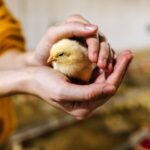If you're anxiously waiting for new chicks to hatch and you have eggs not hatching after 21 days - don't panic.
If the temperature was not exactly right it's possible that the chicks will start to pip the shell and hatch a couple of days late.
For peace of mind, it's also possible to check the eggs to see if something has gone wrong and the eggs can be discarded.
If you're at day 21 and still waiting for your chicks to hatch, here's what you need to know:
Table of Contents
How Long Do Chicken Eggs Take To Incubate and Hatch?
Normally, eggs will hatch 21 days after incubation begins.
Whether a broody mother hen is sitting on her clutch of eggs or you're incubating them yourself in an incubator, 21 days is the expected period.
However, if the temperature and humidity were not exactly right it's possible that the chicks will hatch a couple of days on either side of 21 days.
If you've found a hen sitting on her eggs, it's also possible that you're not sure exactly when the incubation process started.
For these reasons, it's important not to get stressed or panic if you don't see a chick pipping its shell on exactly day 21.
But you should certainly start observing eggs very closely from day 21 onwards, and I recommend testing the eggs to make sure there are live chicks inside ready to hatch.
Related - Here's how to use the warm water method to check if eggs are about to hatch.
Why Would an Egg Fail to Hatch After 21 Days of Incubation?
There are a few reasons why an egg might fail to hatch after incubation has been underway for 21 days.
The most common reason is that the temperature and humidity were not kept at the correct levels.
If the eggs were not turned correctly, or if they were jostled too much, it's also possible that the chicks will pip the shell but be unable to break out.
In some cases, there may be something wrong with the embryo and it won't hatch no matter what you do.
The most common issue that causes an embryo to stop developing is when the internal membranes rupture causing the egg to dehydrate.
This is unavoidable, and something you'll discover when the chick doesn't hatch unless you manage to catch it around day 21 and help the chick hatch.
How Can You Tell If an Egg Will Not Hatch?
If you're concerned that one or more of your eggs may have failed to hatch, you can candle the egg to check if the embryo has been growing properly.
Candling an egg is a process where you shine a bright light into the shell so you can see what's happening inside.
Don't worry, you don't need to use a candle, although that's how it got the name. You can simply use a flashlight or one of the specialized candling devices that are available.
If you see movement inside the egg, the chick is still alive.
If you don't see any movement, it's likely that the embryo has died and the egg should be discarded.
What Does “Pipping” Mean?
Pipping is the term used when a chick starts to break out of its eggshell. You'll know that pipping has started when you see a small hole in the shell.
If you're wondering how a tiny chick is able to pip a hole in its shell, it's because they're born with something called an 'egg tooth'.
Most creatures that hatch from a shell are born with an egg tooth. An egg tooth is a hard tooth-like growth on the end of a chick's beak that enables them to crack its shell.
When a chick pips its shell, it will start to push its way out of the egg and you may hear a faint chirping noise - it's a beautiful thing!
Chicken Eggs Not Hatching After 24 Days?
If you're at day 24 and there is still no sign of a chick pipping, you should check the egg to see if there is a live embryo inside.
One way to do this is to candle the egg as previously explained. Another way is to do a float test or perform the warm water trick as it's also called.
To perform a float test, you'll need a bowl of 100-degree water deep enough for an egg to submerge.
Place an egg in the bowl of water, while doing your best not to disturb the chick that is likely inside.
Depending on how the egg performs in the water, this is what is means:
- Egg sinks to the bottom - It's not a live chick and likely never developed.
- Egg floats low in the water - The chick is alive and is fully developed.
- Egg floats high in the water - It's not a live chick, but this suggests that it was developing.
This should only be used as an additional check. You should always inspect eggs closely and candle them as well to give them a thorough check for a live chick inside.
In Summary
If you're at day 21 and there is no sign of a chick pipping, you should start observing eggs very closely.
I've explained some of the ways you can check if the chick inside is alive and ready to hatch, as well as reasons why it might take a little longer than 21 days.
Resources
Image credits - Photo by Muhammad Syafi Al - adam on Unsplash




